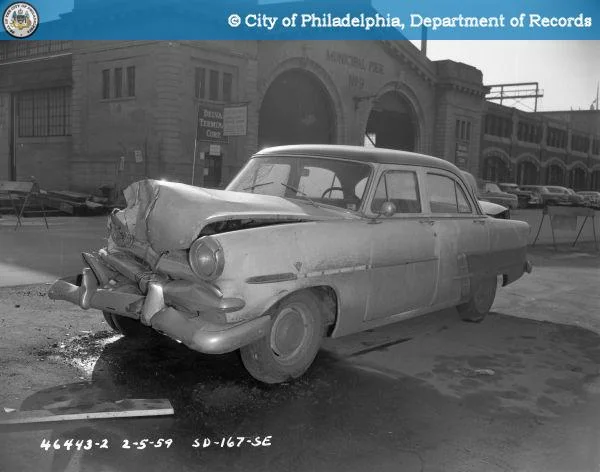Traffic Deaths Aren't "Accidents"
February 1959: A crash, not an "accident," near Delaware Avenue and Race Street.
BY RANDY LoBASSO
A little over a year ago, the nation was shocked to learn that an Amtrak train had run off the rails in the Port Richmond section of Philadelphia, killing seven people. And earlier this week, it was revealed that the crash was likely caused by a “distracted” engineer, something many suspected from the beginning. After all, trains don’t just crash in the United States.
Not so with cars. People crash cars so often and kill so many people, it’s a part of everyday life. Americans have become passive to the 90 daily deaths and thousands of injuries caused by people driving cars that we’ve come to call them “accidents.”
Look at headlines throughout American media and car “accidents” regularly happen in the most horrific of circumstances: people in cars regularly run down people in crosswalks, they jump the curb and nail people on sidewalks, they run over people on bikes, they drag-race, and sometimes when they kill someone with their car, they leave the scene.
Given that May is Bike Month — and many of us cyclists will be participating in the annual Ride of Silence this week, which commemorates bicyclists killed in traffic violence — it seems appropriate to point out that the numerous cyclists we remember on Wednesday evening all died violently after getting hit by people driving cars. Many of the people driving those cars left the scene of the crime. And no, when a person operating a machine kills another person, it’s not an accident. It’s a crash. Language matters. And it’s well past time we all start calling out traffic violence for what it is, and what it is not.
To those who don’t deal with this every day, the language of something like a car crash may seem trivial. But it’s important to note that the term accident is meant to apply to things that cannot be avoided, and, generally, do not have dire consequences: Spilling your drink or losing your keys may be an accident, but the term has been liberalized to help people avoid taking responsibility for their own actions.
As has been noted by Families for Safe Streets in New York City, factory owners would often call worker deaths and injuries in unsafe conditions “accidents” before the Labor Movement began forcing safer conditions in workplaces. The same went for drunk driving crashes before the U.S. took on that epidemic.
It’s easy to shrug your shoulders and chalk something up as an accident, saying it just happens, because that’s life. But accidents are generally unavoidable. Car crashes are not.
Statistically speaking, cars are death machines. In Philadelphia alone, nearly 100 people die each year in traffic crashes. There are more than 10,000 annual crashes in the city, costing us all $1 billion in infrastructure, vehicle damage, health care and funeral costs.
Most traffic deaths are caused by drivers either going too fast or driving while distracted — something we’re seeing more and more as people become attached to their smart phones at the face. A full 61 percent of drivers ages 16-65 admitted to texting while driving in a 2015 AT&T survey; 33 percent admitted to using email, 27 percent said they use Facebook, 17 percent take selfies, and so on. If you kill someone because you’re using Snapchat behind the wheel, that’s no accident.
Recently, transportation advocacy groups around the United States, led by Transportation Alternatives in New York City, have begun trying to change the language and discourse of vehicular crashes.
The campaign is meant to bring about greater awareness of what it means when our streets are designed poorly, our enforcement procedures aren’t up to par, and reading Donald Trump’s latest Twitter rant while operating a 2-ton piece of machinery traveling at 40 miles per hour is considered, by some, normal.
The campaign has begun catching on. The Associated Press recently put out a statement about this in April: “When negligence is claimed or proven, avoid accident, which can be read as exonerating the person responsible,” the AP Stylebook’s Twitter account wrote, accounting what is largely a symbolic gesture, for now.
In the meantime, it’s important to note that, as CityLab pointed out on this issue, the words we use to describe our events describe the kind of world we live in. Amtrak exists in a world where accidents do not just happen. Something has to go terribly wrong to kill seven people.
The world in which cars are the main means of transportation, on the other hand, is incredibly violent and passive.
When car crashes are just “accidents,” it helps foster the idea that our city’s streets do not need to be reconfigured to better accommodate people on bikes, people on foot, and people with disabilities. It coddles the culture of hit-and-run drivers menacing our streets, or drag-racing down Roosevelt Boulevard for fun. Accidents may happen, but serious injury and deaths in traffic are avoidable.
The Ride of Silence, hosted by the Bicycle Coalition of Greater Philadelphia, will take place on Wednesday, May 18 at 6:45pm. The group will congregate at the Art Museum steps and ride eight miles around Philadelphia to commemorate the bicyclists killed in Philadelphia over the past year. For more information, click here.
Randy LoBasso is the Communications Director for the Bicycle Coalition of Philadelphia.




